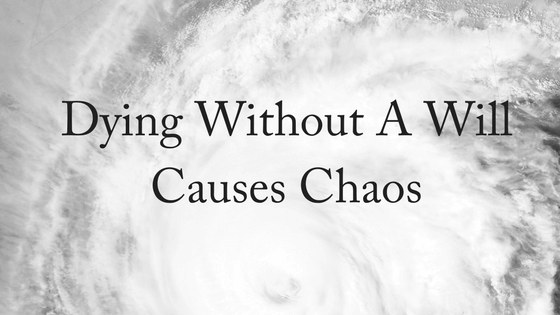Dying without a will often leads to chaos, particularly if you have a complex family or business structure. Dying without a will means that you leave your family with no instructions about your final wishes, including your assets, your funeral plans and who should care for your minor children.
Dying Without a Will: A Mistake
Lawrence Inlow was a successful businessman with a degree in law. After graduating from the Indiana University School of Law, he helped to found a provincial insurance company, Conseco, in 1982. It went public only three years later and by 1997, the company was worth more than five times its value at public offering. Mr Inlow was worth over $100 million dollars by 1997, in the position of Chief Counsel of Conseco, Inc. However, the same year, he was struck by the rotor blade of a helicopter in which he took regular work trips and instantly killed at the age of 46. A chaotic estate battle over his $100 million fortune erupted immediately.
 Despite Mr Inlow’s success in business and his law degree, he had made one fatal error: dying without a will. As a result, his estate had to distributed under the Indiana laws of intestacy. This means that regardless of what Mr Inlow would have wanted, and regardless of what his family wanted, his estate would be distributed according to a default scheme.
Despite Mr Inlow’s success in business and his law degree, he had made one fatal error: dying without a will. As a result, his estate had to distributed under the Indiana laws of intestacy. This means that regardless of what Mr Inlow would have wanted, and regardless of what his family wanted, his estate would be distributed according to a default scheme.
Under the intestate laws of that jurisdiction, the surviving spouse receives one-half of the estate if the deceased is survived by at least one child, or by a grandchild of at least one pre-deceased child. If there are no children but the deceased’s parents are still alive, the spouse receives three-quarters of the estate. If there are no children or parents, the spouse receives all of the estate. If the surviving spouse is the second spouse, and she had no children with the deceased, she gets only one-quarter of the estate. Mr Inlow’s estate was not simple, because he had been married twice and had five children from the two marriages. His surviving spouse, Anita, had a child with him. His four adult children had been born to his first wife.
The Issues of Dying Without a Will
The first issue was that the court had to appoint an executor. Without a will, nobody knows who the deceased wanted to administer his estate, and so in this case, the court appointed a lawyer to handle the estate. The lawyer met with all parties and a proposal was made that Anita would be given a distribution of $18 million, and that Anita would be responsible for paying any income tax on the $18 million. Thereafter however, the lawyer decided that the estate would pay the tax, rather than Anita.
This decision led to the first round of litigation. The four children from Mr Inlow’s first marriage brought an action against Anita for the payment of the income tax, and then the full distribution of $18 million. The court decided that Anita was entitled to the $18 million, and that the lawyer who’d been appointed to administer the estate had acted within his authority to decide that the estate would pay the income tax. The lawyer resigned from the position of administering the will and was replaced with the Fifth Third Bank.
The second issue was the funeral. Mr Inlow was given an ornate funeral, and the total cost of the funeral, burial and mausoleum added up to over $284,000. Initially, the costs were paid by Anita, but she sought and received reimbursement from the estate for these costs. However, the bank (the new administrator of the estate) and the four children launched an action seeking that the funeral costs be taken from Mr Inlow’s wrongful death settlement proceeds. The estate had received almost $885,000 for the accident which claimed Mr Inlow’s life. Anita objected to the action, and the case ended up in the Indiana Supreme Court. The four adult children won this round of litigation, and the court ordered the estate to recover the funeral expenses from the wrongful death fund.
By dying without a will, Mr Inlow contributed to litigation on both fronts. He could have made it known how his $100 million fortune was to be divided between his adult children and his current spouse. He could have indicated how his funeral expenses ought to be managed. He could have identified who he wanted to be the executor of his estate. He could have established directions about how any tax should be paid and who would be responsible for it. Instead, his family endured two bouts of litigation and hundreds of thousands of dollars in fees so that the court could make a decision for them.
What Estate Planning Lessons Can You Learn From Mr Inlow’s Chaos?
- Make sure you have a will
- Identify a trusted person to be the executor
- Think about how you would like to leave your assets and to whom
- Understand that being part of a blended family makes the situation even more complex
- Think about what-if scenarios – what if one of your beneficiaries goes through a divorce or goes bankrupt?
Succession law is complex, and you need to seek the advice of someone who is an expert. For any issue regarding wills, estates, or estate disputes, contact us today for your FREE, 10-minute phone consultation.

